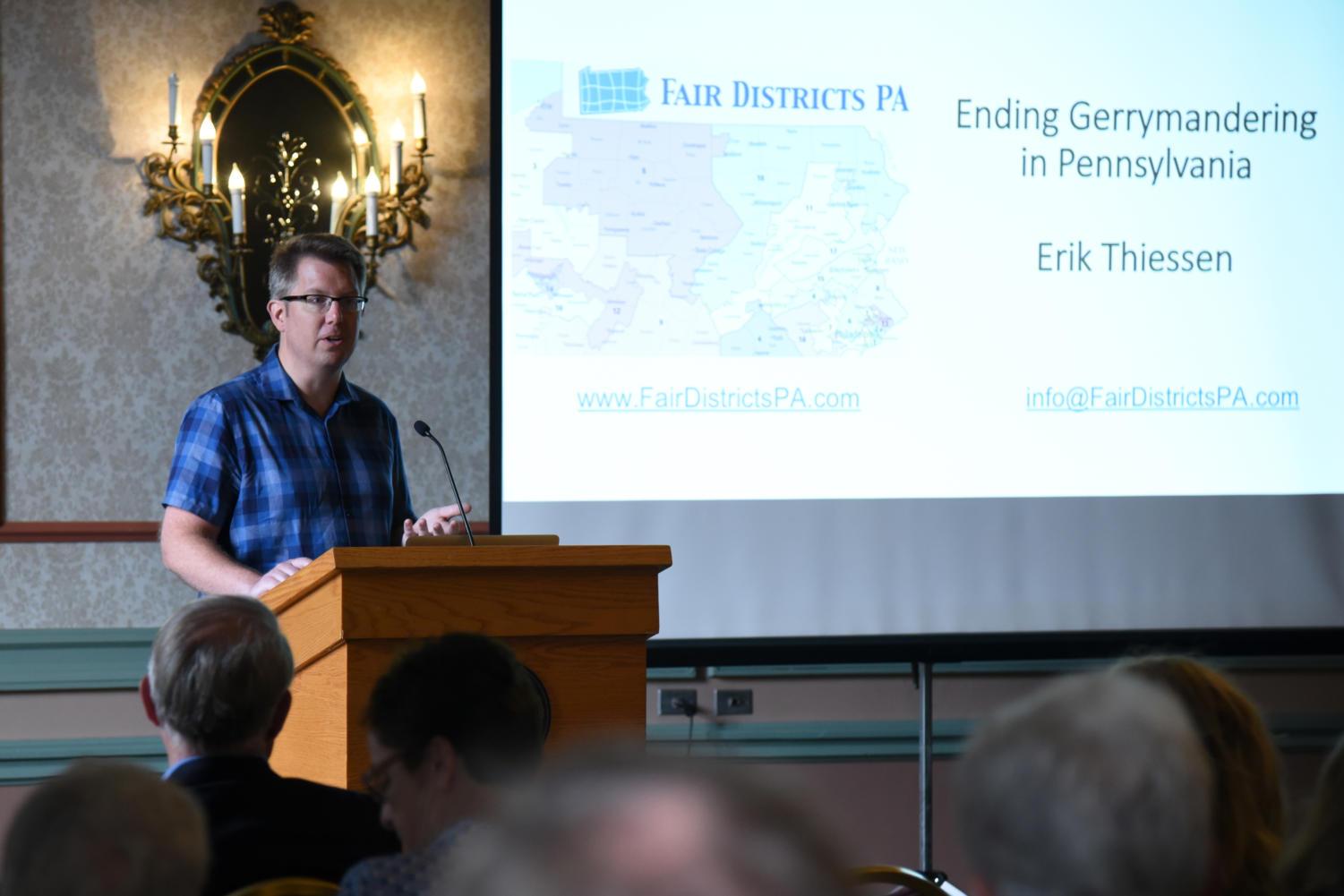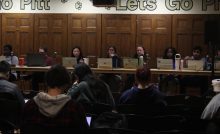Redistricting advocates unpack gerrymandering


Erik Thiessen, a member of Fair Districts PA, speaks about the impact of gerrymandering on voters at Tuesday afternoon’s “Let’s Talk Gerrymandering” event. (Photo by Knox Coulter | Staff Photographer)
Erik Thiessen isn’t happy that the Pennsylvania 7th Congressional District “looks like a picture of Goofy kicking Donald Duck.”
Thiessen is a representative for Fair Districts PA — a nonpartisan organization that aims to create a fair process for redistricting. He said his cartoonish comparison of the 7th district, which includes parts of the Philadelphia suburbs and Delaware County, actually represents a major issue that limits voters.
“People in government aren’t listening to their voters,” Thiessen said. “They don’t represent their voters anymore. Gerrymandering allows elected officials to pick their voters.”
Thiessen spoke about this at an event called “Let’s Talk Gerrymandering,” held in the William Pitt Union Kurtzman Room Tuesday and hosted by the Osher Lifelong Learning Institute — a membership-based community where adults 50 and older can take classes at Pitt. The event was a way to create a dialogue about the issue of gerrymandering and how it impacts voters, according to the event description.
Thiessen and the second speaker at the event — Chris Satullo — each represented organizations that focus on educating people about and pushing for legislation against gerrymandering. Satullo is the project director of Draw the Lines, a “statewide civic education and engagement initiative,” according to its website.
The concept of gerrymandering, as Thiessen explained, is essentially a technique that state legislators use to manipulate district boundaries. District lines are redrawn every 10 years after each U.S. census — gerrymandering is the process by which legislators use this opportunity to draw districts that house more of their voters in an area in an attempt to win more districts.
The term was coined in March 1812 as a reaction to a redrawing of Massachusetts state senate election districts under Gov. Elbridge Gerry. The cut-up districts in the Boston area resembled a salamander, so Gerry’s last name was merged with the word salamander to create the term.
Because legislators will draw district lines to favor their party, Thiessen said this creates a system that is not representative of the actual population of states like Pennsylvania. Thiessen said Berks County is not being represented fairly due to a bizarre configuration of redistricting.
“Berks County has more Democratic representatives than Republican representatives, but they’re surrounded by Amish territory, which is more Republican, so it gets plopped in this district that’s now mainly Republicans,” Thiessen said.
There are also different variations of gerrymandering, as Thiessen showed on a graph. He explained that a “competitive” variation, where an equal number of Republicans and Democrats are represented in each district, is more fair than one like “packing,” when a party concentrates the opposing party’s voting power in one district to reduce its voting power in other districts. Thiessen said Abraham Lincoln’s famous saying that “government is of the people, by the people, for the people” is “under threat.”
“The will of the people is not the priority of our elected officials,” Thiessen said. “Legislators are more concerned with toeing their party line than caring about what their voters want.”
Satullo said part of the reason why the government is taking advantage of the will of the people is because they now have access to complex mapping technologies, which allow them to deepen this issue of gerrymandering. He described how smart technology has found a way to tap into voters’ interests through Facebook and other social media in order to evaluate party lines geographically.
“We are now in Pennsylvania standing at an inflection point,” Satullo said. “Gerrymandering got so much worse because of the sophistication of technology. Mark Zuckerberg and Facebook have a large hand in this mess.”
Satullo said he believes citizens have the right to know the kinds of data used to make these maps and that citizens should actually draw the lines, not state officials.
“An election is like a job interview and we’re the boss,” Satullo said. “As the bosses of democracy, we [are] letting these other people draw the lines … Anyone in this room has as much of the right as state legislators to draw the lines.”
Satullo explained that anyone can make an account on Draw the Lines’ website and use an online mapping tool called District Builder to draw their own electoral lines to see how effective the practice can be. Fair Districts PA, Thiessen said, has a petition people can sign to end gerrymandering in Pennsylvania.
In addition, Draw the Lines is hosting a statewide competition on its website where Pennsylvania citizens will compete to draw 18 valid districts in Pennsylvania which they will defend with a personal statement. Thiessen emphasized that the true “fix” for gerrymandering is getting citizens involved.
“We can make this [competition] be the will of the people,” Thiessen said. “We can educate ourselves about this and tell everyone we know about it and let legislators know that this issue matters to [us].”
Ed Smith, a member of the Osher Lifelong Learning Institute who attended the discussion, said he is considering entering the competition because he is upset by the unfair representation of districts in Pennsylvania.
“I already signed the petition,” Smith said. “And [I] have done so in the past. I’m not very good at maps, but I might try entering the contest and seeing what suggestions I can make.”
Smith said this is a topic he has always been interested in and feels that it needs to be talked about more.
“I don’t think [this issue] has gotten the coverage that it needs,” Smith said. “People like [Republican State Rep. Mike] Turzai [are getting] away by people letting [gerrymandering] slide. I think that’s terrible and they’re representing themselves, not us, which obviously we know goes on.”
Sharon Gretz, the director of the Osher Lifelong Learning Institute, said she decided to organize this event because of its timeliness, given the midterm elections coming up in November. She opened it up to the members of Lifelong Learning, but also to the Pitt community because she feels this is such a relevant issue in the state now.
“I thought perhaps these organizations could represent a nonpartisan point of view and educate our members on what [gerrymandering is] about,” Gretz said. “Our members are here for the love of learning, but we opened it up to the Pitt community as a whole because we think everyone should be able to participate in a meaningful dialogue about these issues.”
Recent Posts
SGB addresses concerns about ICE presence on campus, hears SJP lawsuit against administration, approves governing code bill
At its weekly meeting on Tuesday at Nordy’s Place, Student Government Board heard concerns about…
ACLU of Pennsylvania sues Pitt over SJP suspension
The ACLU of Pennsylvania filed a federal civil lawsuit against the University of Pittsburgh and…
Marquan Pope: The ultimate shark
One of the most remarkable things about sharks is that an injury doesn’t deter them.…
Who Asked? // Do we really get a summer vacation?
This installment of Who Asked? by staff writer Brynn Murawski mourns the seemingly impossible perfect…
Notes From an Average Girl // Notes from my junior year
In this edition of Notes From an Average Girl, senior staff writer Madeline Milchman reflects…
Meaning at the Movies // The Power of the Movie Theater
In this edition of “Meaning at the Movies,” staff writer Lauren Deaton discusses her love…

